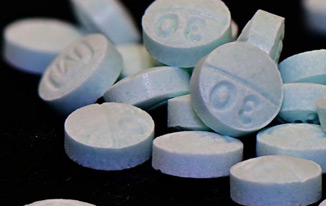Government Alleges Fake Oxycodone (M-30) Pills Containing Fentanyl Caused Overdose and Death to 20-year-old Woman
February 9, 2023 – WASHINGTON – Larry Jerome Eastman, 22, of Temple Hills, Maryland, pleaded guilty yesterday to conspiracy to distribute and possession with intent to distribute Fentanyl. His  sister, Justice Michelle Eastman, 26, of Washington, D.C., pleaded guilty on January 31st. The pleas were announced by U.S. Attorney Matthew M. Graves, Special Agent in Charge Jarod Forget, of the Washington Division Office of the U.S. Drug Enforcement Administration (DEA), and Chief Robert J. Contee III, of the Metropolitan Police Department (MPD).
sister, Justice Michelle Eastman, 26, of Washington, D.C., pleaded guilty on January 31st. The pleas were announced by U.S. Attorney Matthew M. Graves, Special Agent in Charge Jarod Forget, of the Washington Division Office of the U.S. Drug Enforcement Administration (DEA), and Chief Robert J. Contee III, of the Metropolitan Police Department (MPD).
Sentencing hearings for both defendants are scheduled for June 15, 2023.
The defendants were arrested approximately one year ago, on January 26, 2022, following an investigation into the April 6, 2021, Fentanyl overdose death of a woman in Southeast Washington, D.C.
According to the government’s evidence, the 20-year-old Southeast Washington, D.C. woman survived an earlier overdose in November of 2020, and was revived when paramedics administered Narcan. At the time of her fatal overdose in April 2021, white powder was discovered on a coffee table at the woman’s apartment. The DEA analyzed the powder and determined it to be Fentanyl. An autopsy determined the Victim’s cause of death was acute Fentanyl intoxication.
A review of the female victim’s phone found text messages from the previous evening with Larry Eastman where the victim asked for “jammers” (a street term that often refers to counterfeit blue Oxycodone pills that contain Fentanyl). Eastman directed the victim to his address in Washington D.C. and requested that she make payment to a Cashapp account registered to Justice Eastman. Additional communications between the Defendant and the victim went as far back as September 2020, the start of the conspiracy. When the two defendants were arrested in January 2022, law enforcement seized additional fake Oxycodone (M30) pills, which contained Fentanyl, and match the pills that the defendants were working together to sell.
As noted by the DEA, because of its potency and low cost, Fentanyl is increasingly being mixed with other drugs including heroin, methamphetamine, and cocaine, increasing the likelihood of a fatal interaction. Particularly dangerous are fake prescription pills like the fake oxycodone M30 tablets seized in this case, which contain Fentanyl. The DEA Laboratory has found that, of the Fentanyl-laced fake prescription pills analyzed in 2022, six out of ten now contain a potentially lethal dose of Fentanyl (see One Pill Can Kill).
The charge of conspiracy to distribute and possess with intent to distribute Fentanyl carries a statutory maximum of 20 years in prison. A federal district court judge will determine any sentence after considering the U.S. Sentencing Guidelines and other statutory factors.
The case was investigated by the Washington Division Office of the DEA and the Metropolitan Police Department. The case is being prosecuted by Assistant U.S. Attorneys David T. Henek, Andy T. Wang, and Matthew W. Kinskey, of the Violence Reduction and Trafficking Offenses Section of the U.S. Attorney’s Office for the District of Columbia.
Source: DOJ Release
Photo credit: DEA








